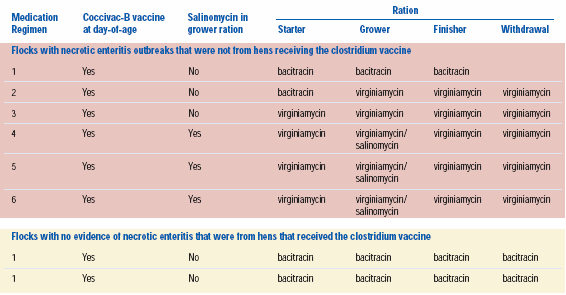Necrotic enteritis outbreaks in broilers stop after vaccination of hens with clostridium toxoid
Outbreaks of necrotic enteritis in conventional broiler flocks stopped after breeder hens were vaccinated with a new clostridium toxoid vaccine, Dr. Neil Ambrose said at the European Poultry Conference held last fall in Verona, Italy.
Necrotic enteritis outbreaks in broilers stop after vaccination of hens with clostridium toxoid
Outbreaks of necrotic enteritis in conventional
broiler flocks stopped after breeder hens were
vaccinated with a new clostridium toxoid vaccine,
Dr. Neil Ambrose said at the European Poultry
Conference held last fall in Verona, Italy.
The initial experience with the vaccine indicates that
"passive immunity to Clostridium perfringens type A alpha
toxin appears to be a viable strategy for the control of
necrotic enteritis in broiler chickens," said Ambrose,
director of veterinary services for Sunrise Farms of
Surrey, British Columbia, Canada.
The vaccine, Clostridium perfringens type A toxoid,
was developed by Schering-Plough Animal Health and is
the first product of its kind for poultry, although clostridium
toxoids have been used in other species for many
years. Two doses of the vaccine are administered to hens,
initiating immunity to the alpha toxin produced by C. perfringens,
which is the most common cause of necrotic
enteritis in chickens. The hens pass on the immunity to
their broiler progeny.
Necrotic enteritis, Ambrose said, can be devastating,
resulting in high mortality and reduced feed intake,
weight gain and flock profitability. The problem is especially
difficult to control in birds on wheat-based rations,
which are common in Canada.

With a trend in many parts of the world towards the
production of broiler chicken meat without the aid of
antibiotics, including ionophore anticoccidials, Ambrose
started trials for Sunrise Farms by using a live coccidiosis
vaccine instead of an in-feed anticoccidial in wheat-fed
birds. However, in 2005, the company had six consecutive
cycles of about 30,000 birds that experienced necrotic
enteritis outbreaks. The birds had received Coccivac-B,
a non-attenuated coccidiosis vaccine based on live
Eimeria field strains, at day-of-age and the in-feed antibiotic-
growth promoter bacitracin and/or virginiamycin.
Three of the flocks also received the anticoccidial salinomycin,
which was added to stem the necrotic enteritis
outbreak, but did not.
For each flock, there were two peaks in mortality
attributed to necrotic enteritis, which occurred at about
19 and 27 days of age. Both roughly corresponded to
expected peaks in coccidial cycling from the non-attenuated
vaccine, he said.
"It is likely that the combination of intestinal viscosity
associated with the wheat ration and the mucosal disruption
caused by the normal cycling of the coccidial
vaccine allowed the overgrowth of C. perfringens, triggering
the necrotic enteritis events," he said. "There was no
evidence of coccidial lesions outside of the normal
expected levels for the coccidial vaccine, which appeared
to be performing normally, with adequate development
of immunity to coccidiosis."
Trial flocks

Sunrise Farms wanted to determine if passive immunity
provided by the new clostridium vaccine could replace
or augment in-feed antibacterial medication given to
broilers that are fed a wheat-based diet, which is common
in Canada, he said.
The company grew two broiler flocks from hens that
had received the toxoid vaccine. Both flocks were vaccinated
with Coccivac-B at day-of-age and the broilers,
which totaled about 24,000 in number, received only the
growth promoter bacitracin in the starter, grower and finisher
rations. No in-feed anticoccidial was provided
(Table 1).
The results with these test birds
were compared to the six flocks that
had experienced necrotic enteritis
outbreaks and were from hens not
vaccinated with the clostridium toxoid.
All the birds had received the
same wheat-based diet.
Among birds in the test group,
"there was no evidence of necrotic
enteritis in random birds, culls or
mortality upon post-mortem examination,
which also verified continued
cycling of the coccidiosis vaccine at
acceptable levels," Ambrose said.

Better growth after toxoid
Growth performance in the flocks
from clostridium-vaccinated hens met
breed standards and, in fact, surpassed
growth in the control group, explained Ambrose. These
results were achieved in the second flock despite severe
heat stress at 27 days of age due to
unseasonably high environmental
temperatures, he said.
"Passive immunity against the C.
perfringens type A alpha toxin
appeared to successfully augment infeed
medication to prevent lesions of
necrotic enteritis when a non-attenuated
coccidiosis vaccine was used in
concert with a wheat-based ration,"
Ambrose concluded.
Sunrise Farms, he added, was
planning further testing to determine
whether passive immunity provided
by the clostridium vaccine could
control necrotic enteritis when
reduced levels of in-feed medication
are given or in the complete absence
of in-feed medication.
Editor's note: For more information on the experiences of
Sunrise Farms, see the article that begins on page 11.







